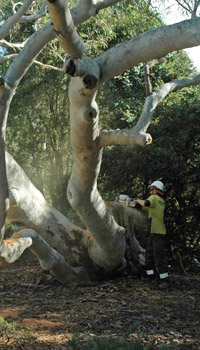Horticulture - Pruning and tree surgery
The horticulturists prune to remove diseased, damaged or dead material on plants. This is critical in the nursery and glasshouse for the maintenance of hygiene and to prevent fungal disease. Outdoors the collection suffers from animals, especially rabbits and wallabies, eating the foliage of plants.
The horticulturists reshape any plants that pose a potential safety risk. For instance, they will prune back any broken branches or prickly plants that protrude into high visitation areas. If they pose no danger, tree hollows or the remains of broken limbs are left for roosting or nesting animals.
The Gardens bring in contract tree surgeons to reshape or remove larger trees. Some of the feature trees, especially those that pre-date the Gardens, have had their health assessed by specialist arborists. The reports provide information on the internal structure of the tree including the amount of solid wood and any signs of decay.
Material created by pruning, tree lopping and removal are chipped on site to create mulch.
Pruning helps some plants, like the Rutaceae, to remain bushy and healthy and encourages flowers production. Occasionally, a basal prune – a severe prune down to ground level removing all branches – is attempted on older woody plants. This method of rejuvenation only works on a small percentage of plants, however, it is generally successful with east coast Myrtaceae. Afterwards the plants need fertilising and additional watering.
Horticulturists will heavily prune or even remove plants that are crowding plants that are more desirable in terms of the value of the collection. For instance, Eucalyptus viminalis and Acacia melanoxylon were used as "nursery plants" in the rainforest to rapidly establish cover and protection for the more delicate rainforest plants. Over the past 10 years, these trees have been removed from the rainforest to allow more light to penetrate to ground level. In the glasshouse, pruning larger fast-growing plants assists with air circulation and prevents fungal diseases.
![Director of National Parks [logo]](../../../images/dnp_90px.gif)






